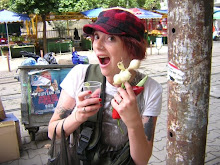My husband and I spent a few weeks in Bulgaria this summer... it was pretty much like I had died and gone to Slavic Food Heaven. Eastern European food has such a bad (and, I feel, totally undeserved) reputation, but Bulgarian food totally buries all the stereotypes about unseasoned sausage and overcooked cabbage/potatoes. It's very aromatic, with lots of peppers, eggplants, and tomatoes; sunflower oil and nutty bulghur wheat. The kashkaval is delicious and sprinkled on all pastries and pizzas, and tastes like a silkier, more mild feta than the Greek varieties.
There is a heavy Turkish influence that comes out pretty strongly in the food. I really can't recommend it enough, and hopefully soon on here I can post photographs of my experiments in ajvar (pinjur) making, the "Balkan Salsa" of roasted and pureed veggies. I'm still trying to figure out how to safely can it, but the acid content is fairly low, so botulism is a concern. My friend from Serbia said that his mother and grandmother make a large enough batch to last the whole year, and they don't seem to have a problem with contamination. I'm a bit of a germ-phobe, though, so I'm not going to take his word on it.
Seeking shelter from a (pretty much daily) downpour with a few Zagorkas. The beer is also incredible and, if you live in a larger metropolitan area, I highly suggest you pick up a six-pack to eat with any Meditteranean, Balkan, or Middle Eastern food.
The farmer's market in central Sofia. I made sure to buy several jars of acacia honey to bring back with me!
The better half showing off our raspberry haul! The European Union has really strict laws on the use of GM (genetically modified) crops, so the fruit is especially yummy.
Getting ready to make dinner: shallots, hot peppers, and garlic.
As a champion barista, I was impressed with myself that I managed to make a perfect cup of espresso from a Soviet-era home machine!
AJVAR (PINJUR)
- 3 large eggplants. They should be ripe but still firm to the touch.
- 6 red bell peppers.
- 2 red hot chili peppers (optional, but I'm a smoker and need the extra flavoring)
- 5 garlic cloves, chopped
- Juice of two lemons
- 2 tablespoons red wine vinegar
- 1/2 cup olive or sunflower oil
- 1 tablespoon fresh or dried rosemary, chopped
- 1 tablespoon fresh parsley, chopped
- Salt and pepper to taste
- Preheat oven to 475 degrees and roast the halved vegetables in the oven until the skins become charred and blistery. I like to put aluminum foil under the vegetables to catch the juice that runs out, which can be added to the ajvar later to add flavor. It also saves you a big mess on the pan and in the stove. This will take, all told, about half an hour.
- Put the roasted peppers and eggplant in a brown paper bag for about ten minutes; if you steam the veggies, it will be easier to peel the skins off later.
- Peel the skins off of the vegetables and put them in the compost. You can also shred up the brown paper bag for the compost.
- Run the mixture through a food mill or processor, depending on what consistency you prefer. Add the oil, vinegar, lemon juice, salt and pepper, and optional herbs. Wait to cool and put in a sanitized Ball jar or tupperware.
- I find that the ajvar will keep for up to three weeks, although honestly it doesn't usually stick around for that long. This is a very versatile condiment, and I like to put it on pizza, sandwiches, couscous, and pita. It's great stirred into soup or stew to add texture and flavor, and it's also good with pita chips or crackers. Actually, when it's really fresh, I like to eat it out of the jar by itself with a spoon.








